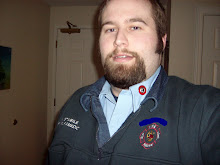Off The Deep End
| You're not supposed to breathe underwater. The entire time you're going under, you're brain is screaming at you to hold your breath. But, when you scuba dive, holding your breath can lead to an overexpansion of the lungs. The air in your tank is at the same pressure as the water around you so when you breathe in a lungfull at 60 its really twice the diameter of a lungfull at sea level. If you ascend with that much, your lungs can pop like balloons. With that in mind, I depress the button on my BC and do my damnedest to continue breathing normally. I guess I suceeded, as my lungs are still in working order. Dive school teaches you how to plan for and overcome nearly every problem that can occur in the water. What to do if you run out of air, loose your mask, your regulator blows open and you watch your air piss away, you get lost.....you get the picture. My class consists of six firefighters, myself included and a teenager whose father wants a dive buddy. Firefighters from anywhere in the world will automaticaly gravitate toward each other and after a few minutes we determined who the probie was and started giving him all the shit jobs.In an effort to make the teenage Sean feel like one of the guys I asked him to be my dive buddy. He's a thin little stick figgure of a guy and I'm pretty big so it was a Laurel and Hardy match from the begining. We practiced what to do if our masks became inundated, basically look up and blow out your nose. After learning how to maintain vision we got on to how to breathe off of each other's systems. Remembering to constantly exhale, as to not blow up my lungs, I grabbed Sean's emergency regulator, cleared it and took a breath off of his tank. We swapped several more times to get the feel for it and then practiced sharing the same regulator. Puff, puff pass, puff, puff, pass. Really, two breathes, pass. After going through our diver in distress senarios for the evening, the instructor let us goof around underwater with what was left in our tanks. He showed me how to use my tongue to blow smoke-ring style bubbles toward the surface. I laid on my tank on the floor of the deep end and blasted rings toward the surface and then grabbed emergency regulators from buddies. After breathing off of a ScottPack, I was prepared to breathe out of a Scuba bottle. What I wasn't prepared for was loosing my mask underwater and being able to breathe without vision. Even though its one of next week's drills I decided to tear off my mask underwater and practice remasking and clearing. At first, the sensation of breathing with water swamping your face feels alot like drowning. Having practiced Coast Guard Drown Proofing Training (binding hands and feet and swiming from the deep to low end with no snorkle/mask gear ) I wasn't as panicked as one would expect. The initial shock wore off and I remasked. Of course the face plate was full so I just cleared as usual. Underwater operations are not for everyone, any kind of claustrophobia will induce panic. Looking up at the shimmering surface can cause vertigo. And then theres always that little, almost insignificant fear of drowning. All can be overcome (although I strongly urge you NOT to do the Coast Guard training that I put myself through as it is dangerous and upon retrospect, not all that bright) but in the words of Lt. Mike Dexter, Smitfield Fire/Rescue: "Divin', its not fer everybody. Ya know?" Picture that oh so articulate phrase coming from a dimunitive Jewish man weighing little more than 130 soaking wet. Then think about the fact that he's one of the most highly trained underwater rescue/recovery specialists in New England. The training is intense, even for the entry level I'm going for but its certainly worth it. Eventually I'll have my Public Safety Diver certification and my PADI (international) Rescue Diver with Search and Recovery, but for now I'm having a blast just learning how to breathe underwater. |


0 Comments:
Post a Comment
<< Home